FIT5057 Project Management: Factors Determining IT Project Success
VerifiedAdded on 2023/03/21
|8
|1787
|36
Discussion Board Post
AI Summary
This document provides a comprehensive analysis of the critical success factors in IT project management, arguing that project success extends beyond the traditional triple constraints of scope, cost, and time. It emphasizes the importance of considering additional factors such as stakeholder management, technology mastery, effective team building, and rigorous quality checks. The discussion highlights that early decisions in project design significantly impact project management practices and that neglecting crucial criteria can lead to project failure. The document further includes contributions discussing the role of skilled project leaders, inclusive decision-making, effective communication, and risk management in ensuring project success. It concludes by emphasizing the need for smart planning, open communication, and careful risk management for successful project outcomes. This resource is valuable for students studying project management and seeking a deeper understanding of the multifaceted factors contributing to project success.

Running head: PROJECT MANAGEMENT 1
Project Management
Student’s Name
Institutional Affiliation
Project Management
Student’s Name
Institutional Affiliation
Paraphrase This Document
Need a fresh take? Get an instant paraphrase of this document with our AI Paraphraser
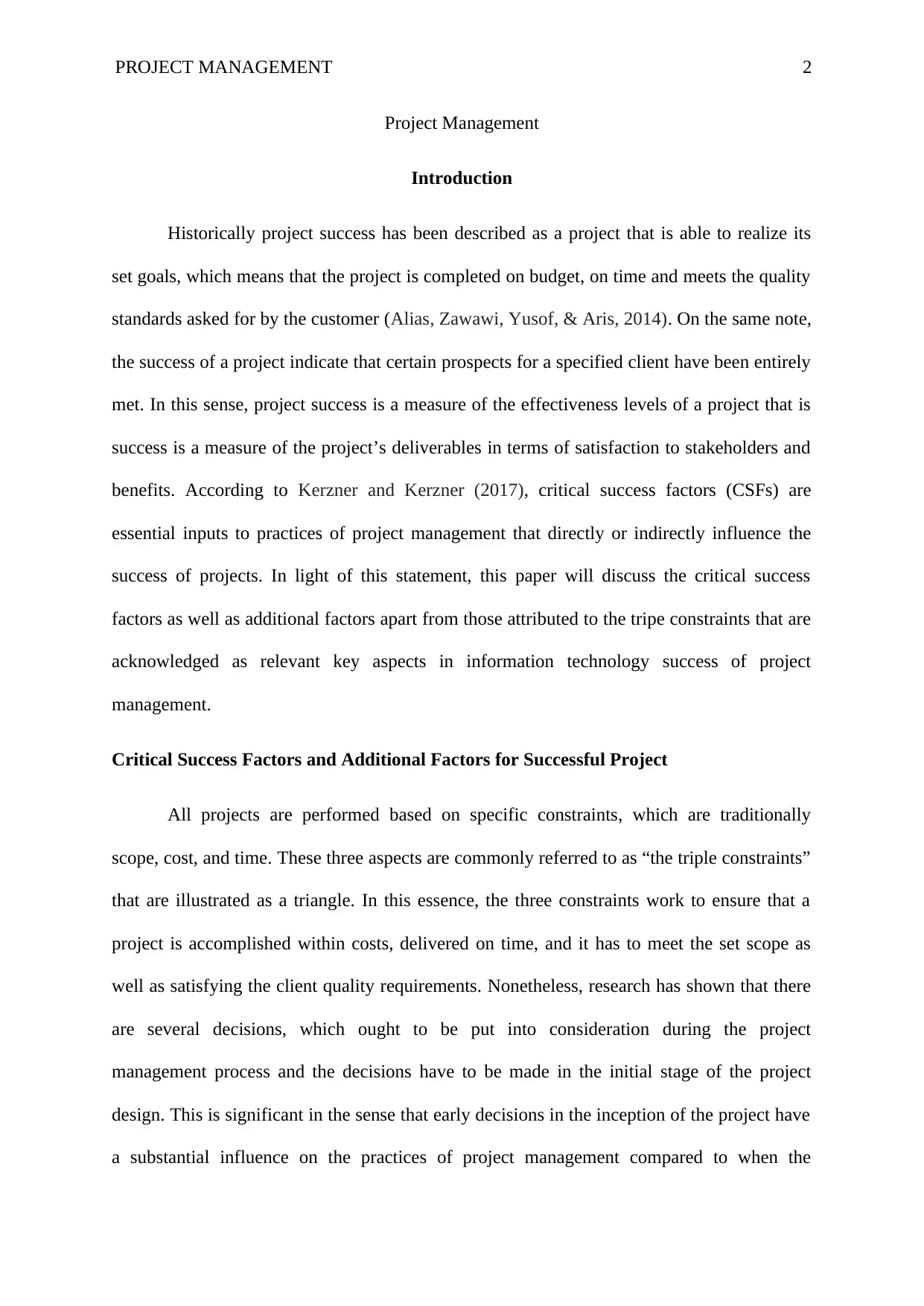
PROJECT MANAGEMENT 2
Project Management
Introduction
Historically project success has been described as a project that is able to realize its
set goals, which means that the project is completed on budget, on time and meets the quality
standards asked for by the customer (Alias, Zawawi, Yusof, & Aris, 2014). On the same note,
the success of a project indicate that certain prospects for a specified client have been entirely
met. In this sense, project success is a measure of the effectiveness levels of a project that is
success is a measure of the project’s deliverables in terms of satisfaction to stakeholders and
benefits. According to Kerzner and Kerzner (2017), critical success factors (CSFs) are
essential inputs to practices of project management that directly or indirectly influence the
success of projects. In light of this statement, this paper will discuss the critical success
factors as well as additional factors apart from those attributed to the tripe constraints that are
acknowledged as relevant key aspects in information technology success of project
management.
Critical Success Factors and Additional Factors for Successful Project
All projects are performed based on specific constraints, which are traditionally
scope, cost, and time. These three aspects are commonly referred to as “the triple constraints”
that are illustrated as a triangle. In this essence, the three constraints work to ensure that a
project is accomplished within costs, delivered on time, and it has to meet the set scope as
well as satisfying the client quality requirements. Nonetheless, research has shown that there
are several decisions, which ought to be put into consideration during the project
management process and the decisions have to be made in the initial stage of the project
design. This is significant in the sense that early decisions in the inception of the project have
a substantial influence on the practices of project management compared to when the
Project Management
Introduction
Historically project success has been described as a project that is able to realize its
set goals, which means that the project is completed on budget, on time and meets the quality
standards asked for by the customer (Alias, Zawawi, Yusof, & Aris, 2014). On the same note,
the success of a project indicate that certain prospects for a specified client have been entirely
met. In this sense, project success is a measure of the effectiveness levels of a project that is
success is a measure of the project’s deliverables in terms of satisfaction to stakeholders and
benefits. According to Kerzner and Kerzner (2017), critical success factors (CSFs) are
essential inputs to practices of project management that directly or indirectly influence the
success of projects. In light of this statement, this paper will discuss the critical success
factors as well as additional factors apart from those attributed to the tripe constraints that are
acknowledged as relevant key aspects in information technology success of project
management.
Critical Success Factors and Additional Factors for Successful Project
All projects are performed based on specific constraints, which are traditionally
scope, cost, and time. These three aspects are commonly referred to as “the triple constraints”
that are illustrated as a triangle. In this essence, the three constraints work to ensure that a
project is accomplished within costs, delivered on time, and it has to meet the set scope as
well as satisfying the client quality requirements. Nonetheless, research has shown that there
are several decisions, which ought to be put into consideration during the project
management process and the decisions have to be made in the initial stage of the project
design. This is significant in the sense that early decisions in the inception of the project have
a substantial influence on the practices of project management compared to when the
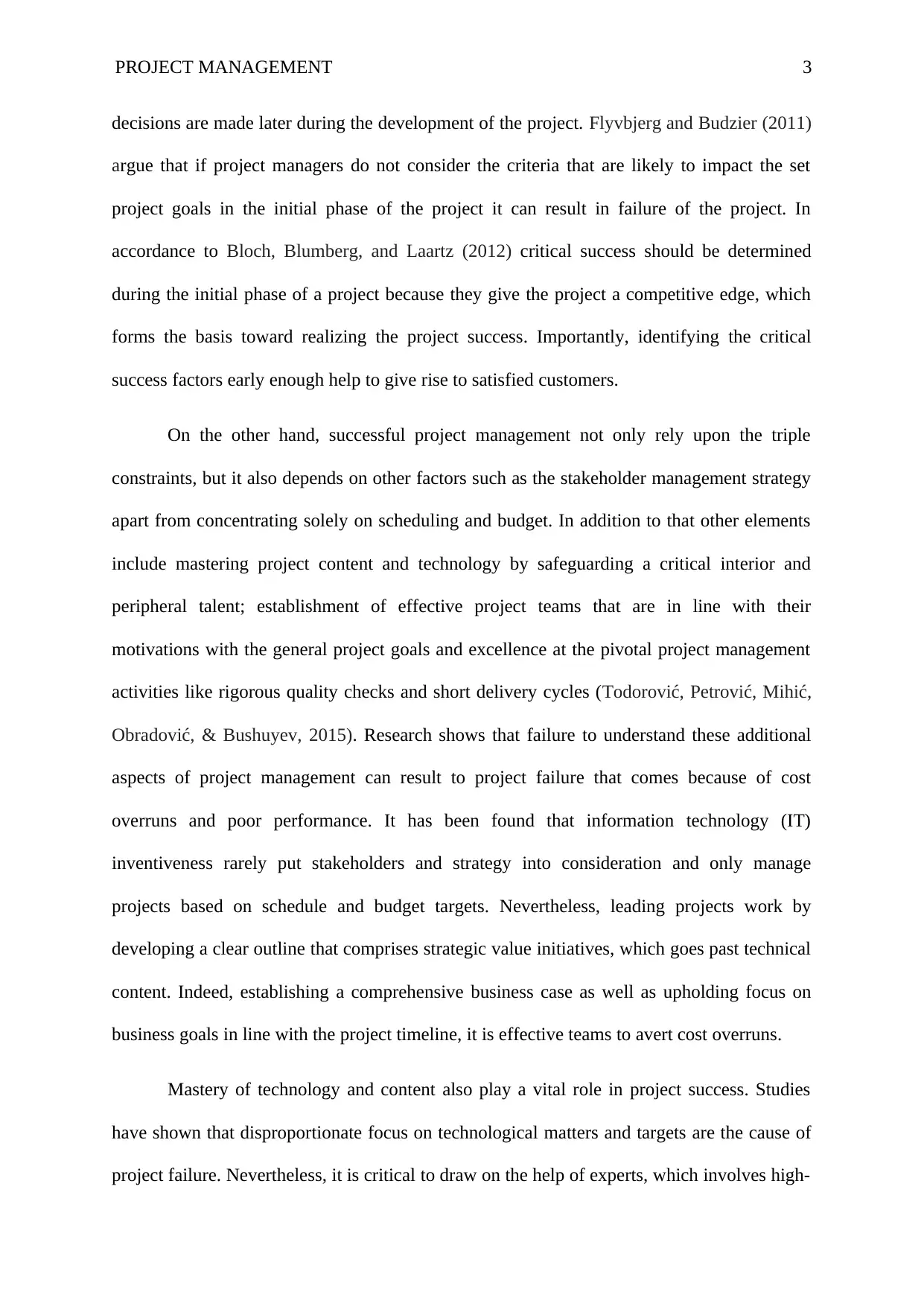
PROJECT MANAGEMENT 3
decisions are made later during the development of the project. Flyvbjerg and Budzier (2011)
argue that if project managers do not consider the criteria that are likely to impact the set
project goals in the initial phase of the project it can result in failure of the project. In
accordance to Bloch, Blumberg, and Laartz (2012) critical success should be determined
during the initial phase of a project because they give the project a competitive edge, which
forms the basis toward realizing the project success. Importantly, identifying the critical
success factors early enough help to give rise to satisfied customers.
On the other hand, successful project management not only rely upon the triple
constraints, but it also depends on other factors such as the stakeholder management strategy
apart from concentrating solely on scheduling and budget. In addition to that other elements
include mastering project content and technology by safeguarding a critical interior and
peripheral talent; establishment of effective project teams that are in line with their
motivations with the general project goals and excellence at the pivotal project management
activities like rigorous quality checks and short delivery cycles (Todorović, Petrović, Mihić,
Obradović, & Bushuyev, 2015). Research shows that failure to understand these additional
aspects of project management can result to project failure that comes because of cost
overruns and poor performance. It has been found that information technology (IT)
inventiveness rarely put stakeholders and strategy into consideration and only manage
projects based on schedule and budget targets. Nevertheless, leading projects work by
developing a clear outline that comprises strategic value initiatives, which goes past technical
content. Indeed, establishing a comprehensive business case as well as upholding focus on
business goals in line with the project timeline, it is effective teams to avert cost overruns.
Mastery of technology and content also play a vital role in project success. Studies
have shown that disproportionate focus on technological matters and targets are the cause of
project failure. Nevertheless, it is critical to draw on the help of experts, which involves high-
decisions are made later during the development of the project. Flyvbjerg and Budzier (2011)
argue that if project managers do not consider the criteria that are likely to impact the set
project goals in the initial phase of the project it can result in failure of the project. In
accordance to Bloch, Blumberg, and Laartz (2012) critical success should be determined
during the initial phase of a project because they give the project a competitive edge, which
forms the basis toward realizing the project success. Importantly, identifying the critical
success factors early enough help to give rise to satisfied customers.
On the other hand, successful project management not only rely upon the triple
constraints, but it also depends on other factors such as the stakeholder management strategy
apart from concentrating solely on scheduling and budget. In addition to that other elements
include mastering project content and technology by safeguarding a critical interior and
peripheral talent; establishment of effective project teams that are in line with their
motivations with the general project goals and excellence at the pivotal project management
activities like rigorous quality checks and short delivery cycles (Todorović, Petrović, Mihić,
Obradović, & Bushuyev, 2015). Research shows that failure to understand these additional
aspects of project management can result to project failure that comes because of cost
overruns and poor performance. It has been found that information technology (IT)
inventiveness rarely put stakeholders and strategy into consideration and only manage
projects based on schedule and budget targets. Nevertheless, leading projects work by
developing a clear outline that comprises strategic value initiatives, which goes past technical
content. Indeed, establishing a comprehensive business case as well as upholding focus on
business goals in line with the project timeline, it is effective teams to avert cost overruns.
Mastery of technology and content also play a vital role in project success. Studies
have shown that disproportionate focus on technological matters and targets are the cause of
project failure. Nevertheless, it is critical to draw on the help of experts, which involves high-
⊘ This is a preview!⊘
Do you want full access?
Subscribe today to unlock all pages.

Trusted by 1+ million students worldwide
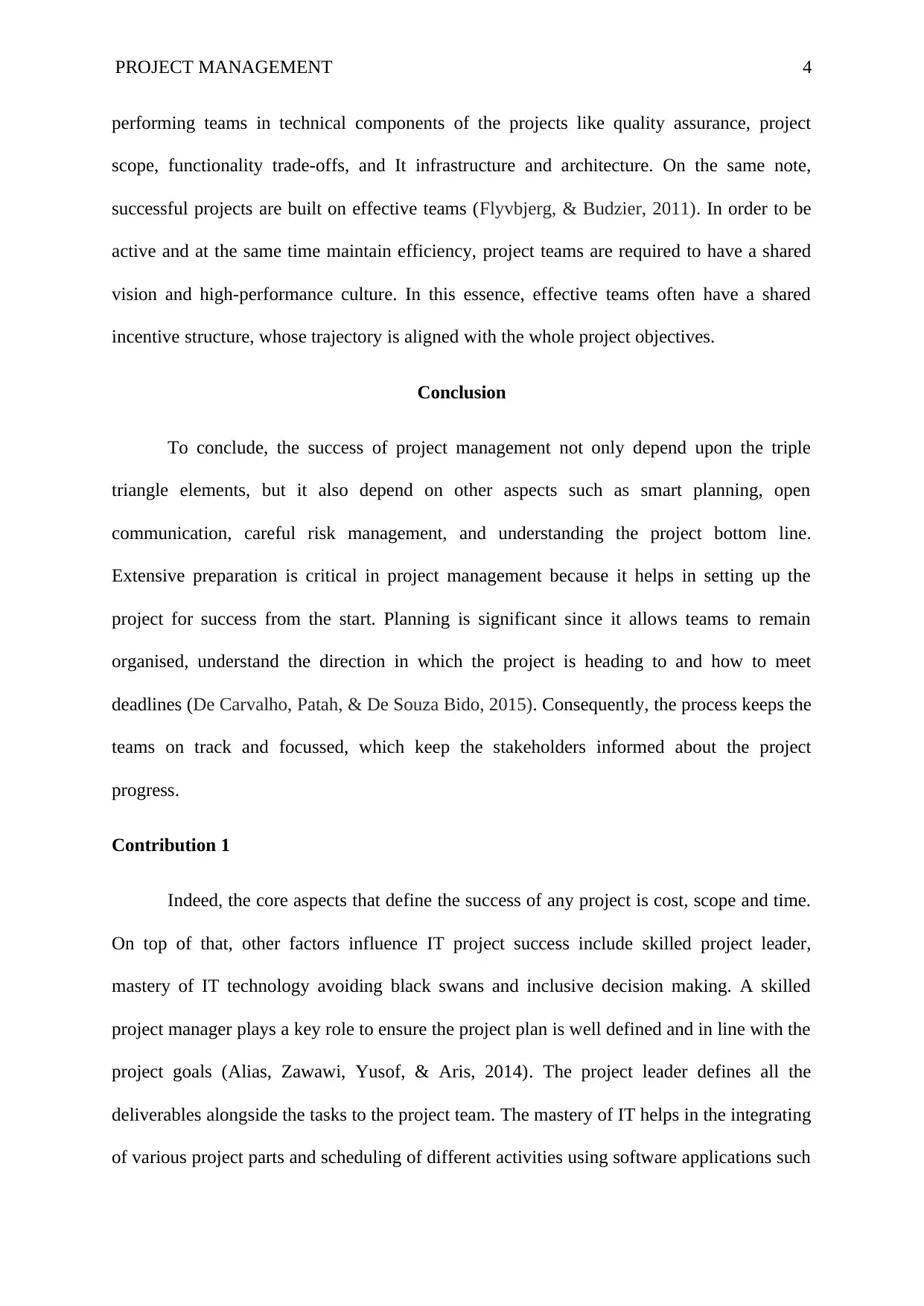
PROJECT MANAGEMENT 4
performing teams in technical components of the projects like quality assurance, project
scope, functionality trade-offs, and It infrastructure and architecture. On the same note,
successful projects are built on effective teams (Flyvbjerg, & Budzier, 2011). In order to be
active and at the same time maintain efficiency, project teams are required to have a shared
vision and high-performance culture. In this essence, effective teams often have a shared
incentive structure, whose trajectory is aligned with the whole project objectives.
Conclusion
To conclude, the success of project management not only depend upon the triple
triangle elements, but it also depend on other aspects such as smart planning, open
communication, careful risk management, and understanding the project bottom line.
Extensive preparation is critical in project management because it helps in setting up the
project for success from the start. Planning is significant since it allows teams to remain
organised, understand the direction in which the project is heading to and how to meet
deadlines (De Carvalho, Patah, & De Souza Bido, 2015). Consequently, the process keeps the
teams on track and focussed, which keep the stakeholders informed about the project
progress.
Contribution 1
Indeed, the core aspects that define the success of any project is cost, scope and time.
On top of that, other factors influence IT project success include skilled project leader,
mastery of IT technology avoiding black swans and inclusive decision making. A skilled
project manager plays a key role to ensure the project plan is well defined and in line with the
project goals (Alias, Zawawi, Yusof, & Aris, 2014). The project leader defines all the
deliverables alongside the tasks to the project team. The mastery of IT helps in the integrating
of various project parts and scheduling of different activities using software applications such
performing teams in technical components of the projects like quality assurance, project
scope, functionality trade-offs, and It infrastructure and architecture. On the same note,
successful projects are built on effective teams (Flyvbjerg, & Budzier, 2011). In order to be
active and at the same time maintain efficiency, project teams are required to have a shared
vision and high-performance culture. In this essence, effective teams often have a shared
incentive structure, whose trajectory is aligned with the whole project objectives.
Conclusion
To conclude, the success of project management not only depend upon the triple
triangle elements, but it also depend on other aspects such as smart planning, open
communication, careful risk management, and understanding the project bottom line.
Extensive preparation is critical in project management because it helps in setting up the
project for success from the start. Planning is significant since it allows teams to remain
organised, understand the direction in which the project is heading to and how to meet
deadlines (De Carvalho, Patah, & De Souza Bido, 2015). Consequently, the process keeps the
teams on track and focussed, which keep the stakeholders informed about the project
progress.
Contribution 1
Indeed, the core aspects that define the success of any project is cost, scope and time.
On top of that, other factors influence IT project success include skilled project leader,
mastery of IT technology avoiding black swans and inclusive decision making. A skilled
project manager plays a key role to ensure the project plan is well defined and in line with the
project goals (Alias, Zawawi, Yusof, & Aris, 2014). The project leader defines all the
deliverables alongside the tasks to the project team. The mastery of IT helps in the integrating
of various project parts and scheduling of different activities using software applications such
Paraphrase This Document
Need a fresh take? Get an instant paraphrase of this document with our AI Paraphraser
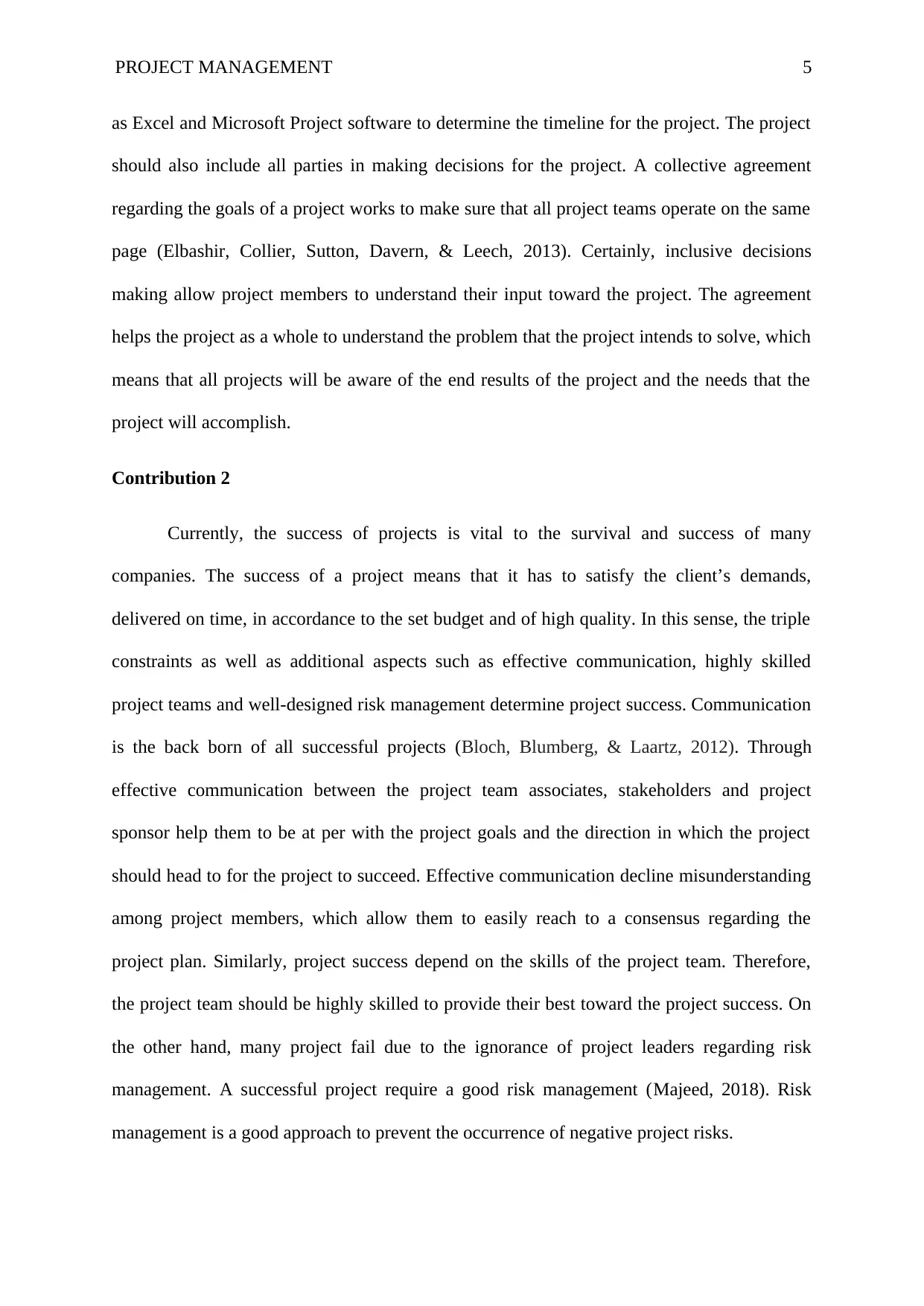
PROJECT MANAGEMENT 5
as Excel and Microsoft Project software to determine the timeline for the project. The project
should also include all parties in making decisions for the project. A collective agreement
regarding the goals of a project works to make sure that all project teams operate on the same
page (Elbashir, Collier, Sutton, Davern, & Leech, 2013). Certainly, inclusive decisions
making allow project members to understand their input toward the project. The agreement
helps the project as a whole to understand the problem that the project intends to solve, which
means that all projects will be aware of the end results of the project and the needs that the
project will accomplish.
Contribution 2
Currently, the success of projects is vital to the survival and success of many
companies. The success of a project means that it has to satisfy the client’s demands,
delivered on time, in accordance to the set budget and of high quality. In this sense, the triple
constraints as well as additional aspects such as effective communication, highly skilled
project teams and well-designed risk management determine project success. Communication
is the back born of all successful projects (Bloch, Blumberg, & Laartz, 2012). Through
effective communication between the project team associates, stakeholders and project
sponsor help them to be at per with the project goals and the direction in which the project
should head to for the project to succeed. Effective communication decline misunderstanding
among project members, which allow them to easily reach to a consensus regarding the
project plan. Similarly, project success depend on the skills of the project team. Therefore,
the project team should be highly skilled to provide their best toward the project success. On
the other hand, many project fail due to the ignorance of project leaders regarding risk
management. A successful project require a good risk management (Majeed, 2018). Risk
management is a good approach to prevent the occurrence of negative project risks.
as Excel and Microsoft Project software to determine the timeline for the project. The project
should also include all parties in making decisions for the project. A collective agreement
regarding the goals of a project works to make sure that all project teams operate on the same
page (Elbashir, Collier, Sutton, Davern, & Leech, 2013). Certainly, inclusive decisions
making allow project members to understand their input toward the project. The agreement
helps the project as a whole to understand the problem that the project intends to solve, which
means that all projects will be aware of the end results of the project and the needs that the
project will accomplish.
Contribution 2
Currently, the success of projects is vital to the survival and success of many
companies. The success of a project means that it has to satisfy the client’s demands,
delivered on time, in accordance to the set budget and of high quality. In this sense, the triple
constraints as well as additional aspects such as effective communication, highly skilled
project teams and well-designed risk management determine project success. Communication
is the back born of all successful projects (Bloch, Blumberg, & Laartz, 2012). Through
effective communication between the project team associates, stakeholders and project
sponsor help them to be at per with the project goals and the direction in which the project
should head to for the project to succeed. Effective communication decline misunderstanding
among project members, which allow them to easily reach to a consensus regarding the
project plan. Similarly, project success depend on the skills of the project team. Therefore,
the project team should be highly skilled to provide their best toward the project success. On
the other hand, many project fail due to the ignorance of project leaders regarding risk
management. A successful project require a good risk management (Majeed, 2018). Risk
management is a good approach to prevent the occurrence of negative project risks.

PROJECT MANAGEMENT 6
⊘ This is a preview!⊘
Do you want full access?
Subscribe today to unlock all pages.

Trusted by 1+ million students worldwide
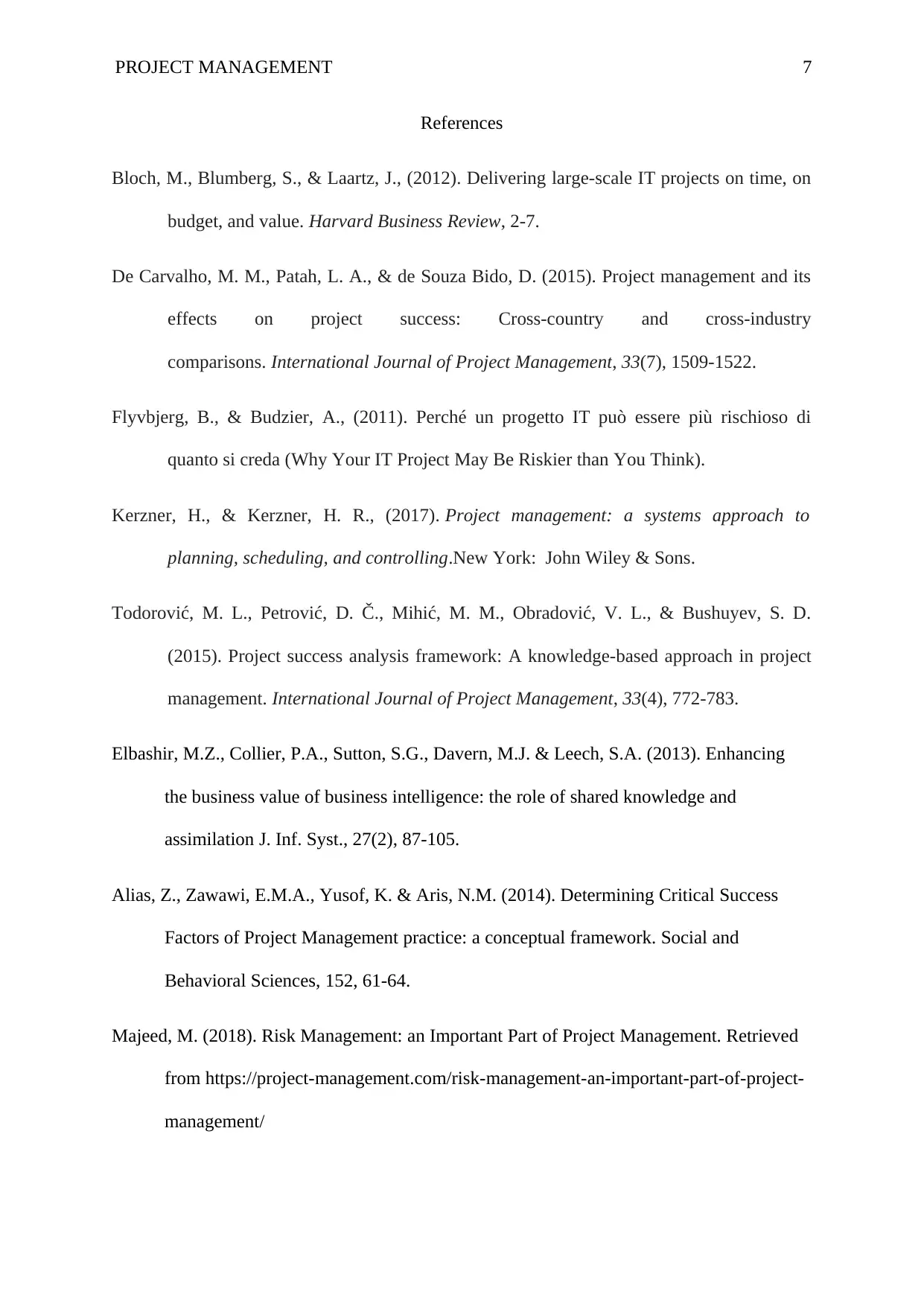
PROJECT MANAGEMENT 7
References
Bloch, M., Blumberg, S., & Laartz, J., (2012). Delivering large-scale IT projects on time, on
budget, and value. Harvard Business Review, 2-7.
De Carvalho, M. M., Patah, L. A., & de Souza Bido, D. (2015). Project management and its
effects on project success: Cross-country and cross-industry
comparisons. International Journal of Project Management, 33(7), 1509-1522.
Flyvbjerg, B., & Budzier, A., (2011). Perché un progetto IT può essere più rischioso di
quanto si creda (Why Your IT Project May Be Riskier than You Think).
Kerzner, H., & Kerzner, H. R., (2017). Project management: a systems approach to
planning, scheduling, and controlling.New York: John Wiley & Sons.
Todorović, M. L., Petrović, D. Č., Mihić, M. M., Obradović, V. L., & Bushuyev, S. D.
(2015). Project success analysis framework: A knowledge-based approach in project
management. International Journal of Project Management, 33(4), 772-783.
Elbashir, M.Z., Collier, P.A., Sutton, S.G., Davern, M.J. & Leech, S.A. (2013). Enhancing
the business value of business intelligence: the role of shared knowledge and
assimilation J. Inf. Syst., 27(2), 87-105.
Alias, Z., Zawawi, E.M.A., Yusof, K. & Aris, N.M. (2014). Determining Critical Success
Factors of Project Management practice: a conceptual framework. Social and
Behavioral Sciences, 152, 61-64.
Majeed, M. (2018). Risk Management: an Important Part of Project Management. Retrieved
from https://project-management.com/risk-management-an-important-part-of-project-
management/
References
Bloch, M., Blumberg, S., & Laartz, J., (2012). Delivering large-scale IT projects on time, on
budget, and value. Harvard Business Review, 2-7.
De Carvalho, M. M., Patah, L. A., & de Souza Bido, D. (2015). Project management and its
effects on project success: Cross-country and cross-industry
comparisons. International Journal of Project Management, 33(7), 1509-1522.
Flyvbjerg, B., & Budzier, A., (2011). Perché un progetto IT può essere più rischioso di
quanto si creda (Why Your IT Project May Be Riskier than You Think).
Kerzner, H., & Kerzner, H. R., (2017). Project management: a systems approach to
planning, scheduling, and controlling.New York: John Wiley & Sons.
Todorović, M. L., Petrović, D. Č., Mihić, M. M., Obradović, V. L., & Bushuyev, S. D.
(2015). Project success analysis framework: A knowledge-based approach in project
management. International Journal of Project Management, 33(4), 772-783.
Elbashir, M.Z., Collier, P.A., Sutton, S.G., Davern, M.J. & Leech, S.A. (2013). Enhancing
the business value of business intelligence: the role of shared knowledge and
assimilation J. Inf. Syst., 27(2), 87-105.
Alias, Z., Zawawi, E.M.A., Yusof, K. & Aris, N.M. (2014). Determining Critical Success
Factors of Project Management practice: a conceptual framework. Social and
Behavioral Sciences, 152, 61-64.
Majeed, M. (2018). Risk Management: an Important Part of Project Management. Retrieved
from https://project-management.com/risk-management-an-important-part-of-project-
management/
Paraphrase This Document
Need a fresh take? Get an instant paraphrase of this document with our AI Paraphraser

PROJECT MANAGEMENT 8
1 out of 8
Related Documents
Your All-in-One AI-Powered Toolkit for Academic Success.
+13062052269
info@desklib.com
Available 24*7 on WhatsApp / Email
![[object Object]](/_next/static/media/star-bottom.7253800d.svg)
Unlock your academic potential
Copyright © 2020–2026 A2Z Services. All Rights Reserved. Developed and managed by ZUCOL.





